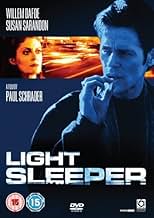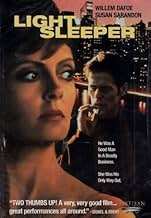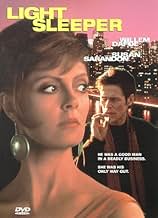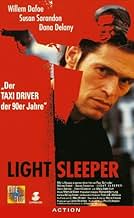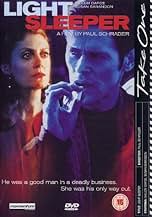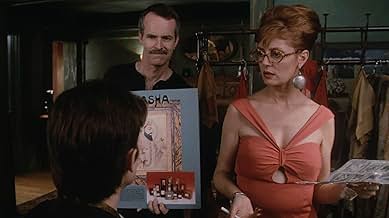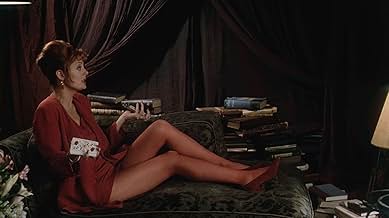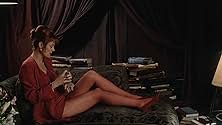IMDb-BEWERTUNG
6,9/10
10.858
IHRE BEWERTUNG
Ein Drogendealer überdenkt seinen Beruf, als sein Boss plant, ehrlich zu werden und eine alte Flamme wieder auftaucht.Ein Drogendealer überdenkt seinen Beruf, als sein Boss plant, ehrlich zu werden und eine alte Flamme wieder auftaucht.Ein Drogendealer überdenkt seinen Beruf, als sein Boss plant, ehrlich zu werden und eine alte Flamme wieder auftaucht.
- Auszeichnungen
- 1 Gewinn & 6 Nominierungen insgesamt
Rene Raymond Rivera
- Manuel
- (as a different name)
Vince Cupone
- Young Cuban
- (as Vinny Capone)
Chris Northup
- Retro Yuppie
- (as Christopher Todd Northup)
Empfohlene Bewertungen
When the subject of modern noir films is discussed, there are always a small group of films that is mentioned. "The Last Seduction", "Blood Simple", "L.A. Confidential", etc. All worthy selections in their own right. Even better, I think, is "Light Sleeper", which is a noir film right down to the core of its being. Taking place almost entirely in afterhours Manhattan, it's the story of John LeTour (Willem Dafoe), a drug courier who works for Ann (Susan Sarandon), delivering cocaine to upscale clients. LeTour wanders around the city, chauffered about in a black sedan by a silent driver named Carlos. It's a lonely existence, one that has "noir" written all over it. But this isn't a shallow or violent or ironically self-aware redux of noir films. Much like another recent Schrader-scripted film, this plunges right into the heart of the story, not standing back at all, undetached. Unlike other recent noir films, such as "The Usual Suspects", this film's soul lies not in convoluted twists and turns, but in redemption. LeTour spends the film searching for a meaning to his life, looking in the wrong place, and eventually finding meaning and hope in a somewhat unlikely place. But in the end, he realizes that it's all he has left to hang onto. A beautiful film.
Critics often rag on Paul Schrader for writing films about scumbags who find violence a shortcut to salvation. The conventional wisdom is that Schrader's scripts play better if Martin Scorsese directs them (Taxi Driver, Raging Bull) and that when Schrader directs Schrader, the result is a heavy, humorless mess. But that's not always true. In directing his own Hardcore and American Gigolo or scripts written in a darkly witty vein (Nicholas Kazan's Patty Hearst, Harold Pinter's Comfort of Strangers), Schrader can be slyly inventive. Crowd pleasing? No. Challenging? You bet.
It's difficult to imagine anyone but Schrader controlling the moral turbulence in his script for Light Sleeper, a boldly resonant thriller that elaborates on Schrader's favored themes of sin and redemption. John LeTour, a drug dealer played by Willem Dafoe, is a loner with direct connections to Taxi Driver's Travis Bickle and American Gigolo's Julian Kay. At forty, LeTour is in crisis. His boss, Ann (a fireball Susan Sarandon), is about to chuck drugs for cosmetics. LeTour is losing his coke customers to crack. And he is spooked by a psychic, strikingly played by Mary Beth Hurt. But in his diary (one of several tips of the hat to Robert Bresson's seminal Pickpocket), LeTour writes, "I can be a good person."
Maybe so, but transcendence doesn't come easy. New York's mean streets, given a noirish sheen by cinematographer Ed Lachman, tempt LeTour as he drives through the night making deliveries to the sleek and the sleazy. He is heartened by a chance meeting with Marianne (Dana Delany), an embittered former love and former addict who lets down her defenses for one night. (Warning: Hearing Delany announce, "I'm dripping," during a hot sex scene with Dafoe may be too much for China Beach fans.) As expected, violence erupts before things settle down. Schrader is out there again, testing the limits of audience tolerance. Good for him. Buoyed by his questing spirit and Dafoe's mesmerizing performance, Light Sleeper might just keep you up nights.
It's difficult to imagine anyone but Schrader controlling the moral turbulence in his script for Light Sleeper, a boldly resonant thriller that elaborates on Schrader's favored themes of sin and redemption. John LeTour, a drug dealer played by Willem Dafoe, is a loner with direct connections to Taxi Driver's Travis Bickle and American Gigolo's Julian Kay. At forty, LeTour is in crisis. His boss, Ann (a fireball Susan Sarandon), is about to chuck drugs for cosmetics. LeTour is losing his coke customers to crack. And he is spooked by a psychic, strikingly played by Mary Beth Hurt. But in his diary (one of several tips of the hat to Robert Bresson's seminal Pickpocket), LeTour writes, "I can be a good person."
Maybe so, but transcendence doesn't come easy. New York's mean streets, given a noirish sheen by cinematographer Ed Lachman, tempt LeTour as he drives through the night making deliveries to the sleek and the sleazy. He is heartened by a chance meeting with Marianne (Dana Delany), an embittered former love and former addict who lets down her defenses for one night. (Warning: Hearing Delany announce, "I'm dripping," during a hot sex scene with Dafoe may be too much for China Beach fans.) As expected, violence erupts before things settle down. Schrader is out there again, testing the limits of audience tolerance. Good for him. Buoyed by his questing spirit and Dafoe's mesmerizing performance, Light Sleeper might just keep you up nights.
With Schrader it always comes back to this. Lonely nights and aimless wandering, always just a step short of being swallowed up in the abyss. But it's always the worst at the brink, where guilt starts eating up inside.
So a jazz ballad about lonely nights, this is what people probably call noir in this. About a man who has come a long, painful way to get nowhere, is tired and looking for his harbor. He's a drug dealer, so we get the awkward encounters in seemy places and travel through other people on the same way down as he has been before.
Sarandon is radiant, fierce but fragile, but this is Dafoe's show, it wouldn't have been the same without Dafoe. He's right inside the character, where the desperation piles up. See how his face lights up when Sarandon invites him to lunch, how he passes through peoples' lives without staying, as though time is running out.
Two instances reveal the betrayal (one involving sex and a madonna painting), both involving mirrors that lie. The reflections reveal people who don't have time to get involved, how everyone's strange when you're a stranger. See if you can spot them out.
It is ultimately about the working out of karma, and how our present hells have been long in the digging. Eventually he has to atone with the one thing he's running out of and can't spare, time.
So a jazz ballad about lonely nights, this is what people probably call noir in this. About a man who has come a long, painful way to get nowhere, is tired and looking for his harbor. He's a drug dealer, so we get the awkward encounters in seemy places and travel through other people on the same way down as he has been before.
Sarandon is radiant, fierce but fragile, but this is Dafoe's show, it wouldn't have been the same without Dafoe. He's right inside the character, where the desperation piles up. See how his face lights up when Sarandon invites him to lunch, how he passes through peoples' lives without staying, as though time is running out.
Two instances reveal the betrayal (one involving sex and a madonna painting), both involving mirrors that lie. The reflections reveal people who don't have time to get involved, how everyone's strange when you're a stranger. See if you can spot them out.
It is ultimately about the working out of karma, and how our present hells have been long in the digging. Eventually he has to atone with the one thing he's running out of and can't spare, time.
This is a pretty good movie about a drug dealer with a conscience. I enjoyed the look and feel of the film, but felt that the script and story-line struggled at points. In one instance, Dafoe's character relates "White drugs for white people". Also, Dana Delaney puts in a good performance but definitely second to Dafoe's - her performance is not quite complete, and I was left feeling as though the film just had that extra something missing.
This is a brilliant film. The raw, humane, unvarnished look at the life of a mid level drug dealer in Manhattan is uniquely captivating, and Willem Defoe plays the part to perfection. The story itself is underwhelming, common, real. The protagonist's struggles through life are much like anyone else's. Anyone else's in New York, at least. But the context of his life, the rhythms of it, are very different. The random encounters with love and violence touch him as arbitrarily as they touch each of us, and he reacts to them with the same confusion, elation, and pain. This is the film's genius, and it allows an unusually close emotional bond to develop between the protagonist and the audience.
Overall rating: 8 out of 10.
This is a brilliant film. The raw, humane, unvarnished look at the life of a mid level drug dealer in Manhattan is uniquely captivating, and Willem Defoe plays the part to perfection. The story itself is underwhelming, common, real. The protagonist's struggles through life are much like anyone else's. Anyone else's in New York, at least. But the context of his life, the rhythms of it, are very different. The random encounters with love and violence touch him as arbitrarily as they touch each of us, and he reacts to them with the same confusion, elation, and pain. This is the film's genius, and it allows an unusually close emotional bond to develop between the protagonist and the audience.
Overall rating: 8 out of 10.
Paul Schrader's finest film to date, and firmly lodged in my top 10, this is a surprisingly overlooked and underrated gem. Often touted as a "modern noir" movie, I really don't consider it in that genre at all.
The heart of the film is a reworking of the themes embodied in Schrader's earlier film "American Gigolo", where a man is forced to confront the fact that the life he is leading is fundamentally unsatisfying, reassess what he wants to do, find out who his real friends are and ultimately get redeemed through love.
Willem Dafoe's character Le Tour's journey is a slow but inevitable one, as his drug-dealing days are numbered due to his boss Susan Sarandon (also splendid) "going straight". Most of the scenes take place at night (hence the noir tag), but this is partly a consequence of the drug-dealing aspect and partly to capture the unreal mood of a man who doesn't know where he fits in to "normal" life. The device whereby Le Tour spends many hours writing his thoughts in an exercise book, throwing it away when he fills it, then starting another one, is so strong and startling that I put aside my usual dislike of narration. The soundtrack is also excellent and fits and expands the mood very well.
The best scene is probably the one in the hospital cafeteria, where Le Tour has a conversation with his ex-girlfriend that he hasn't seen for a long time - immaculately acted, tremendously understated with so many things going unsaid... The final scene, although Schrader nicked it from a French film, and used it before in "Gigolo", is still very powerful, based on the idea that whether a man is in prison or not is completely unrelated to whether he is free.
The heart of the film is a reworking of the themes embodied in Schrader's earlier film "American Gigolo", where a man is forced to confront the fact that the life he is leading is fundamentally unsatisfying, reassess what he wants to do, find out who his real friends are and ultimately get redeemed through love.
Willem Dafoe's character Le Tour's journey is a slow but inevitable one, as his drug-dealing days are numbered due to his boss Susan Sarandon (also splendid) "going straight". Most of the scenes take place at night (hence the noir tag), but this is partly a consequence of the drug-dealing aspect and partly to capture the unreal mood of a man who doesn't know where he fits in to "normal" life. The device whereby Le Tour spends many hours writing his thoughts in an exercise book, throwing it away when he fills it, then starting another one, is so strong and startling that I put aside my usual dislike of narration. The soundtrack is also excellent and fits and expands the mood very well.
The best scene is probably the one in the hospital cafeteria, where Le Tour has a conversation with his ex-girlfriend that he hasn't seen for a long time - immaculately acted, tremendously understated with so many things going unsaid... The final scene, although Schrader nicked it from a French film, and used it before in "Gigolo", is still very powerful, based on the idea that whether a man is in prison or not is completely unrelated to whether he is free.
Wusstest du schon
- WissenswertesWriter/director Paul Schrader experienced a unique problem while filming was underway in New York City. The film is set during a sanitation worker strike which called for large amounts of uncollected trash to be prominently featured in exterior scenes. But since the real New York City sanitation department was very much on the job they would inadvertently collect trash that was meant to be a part of the film's production design.
- PatzerWhen Marianne gets into the car at John LeTour's request, the car window is rolled down halfway. Once the door is closed, the inside angle shows the window closed. Water droplets can be seen on door's glass in the upper right corner of the movie frame.
- Soundtracks24-7-365
(Agami / Belmaati / Christiansen / Moller)
© 1991 Megasong Publishing, Denmark
Performed by Wizdom-N-Motion
Courtesy of Mega Records, Denmark © 1991
Top-Auswahl
Melde dich zum Bewerten an und greife auf die Watchlist für personalisierte Empfehlungen zu.
- How long is Light Sleeper?Powered by Alexa
Details
Box Office
- Budget
- 5.000.000 $ (geschätzt)
- Bruttoertrag in den USA und Kanada
- 1.050.861 $
- Eröffnungswochenende in den USA und in Kanada
- 46.302 $
- 23. Aug. 1992
- Weltweiter Bruttoertrag
- 1.055.987 $
Zu dieser Seite beitragen
Bearbeitung vorschlagen oder fehlenden Inhalt hinzufügen



